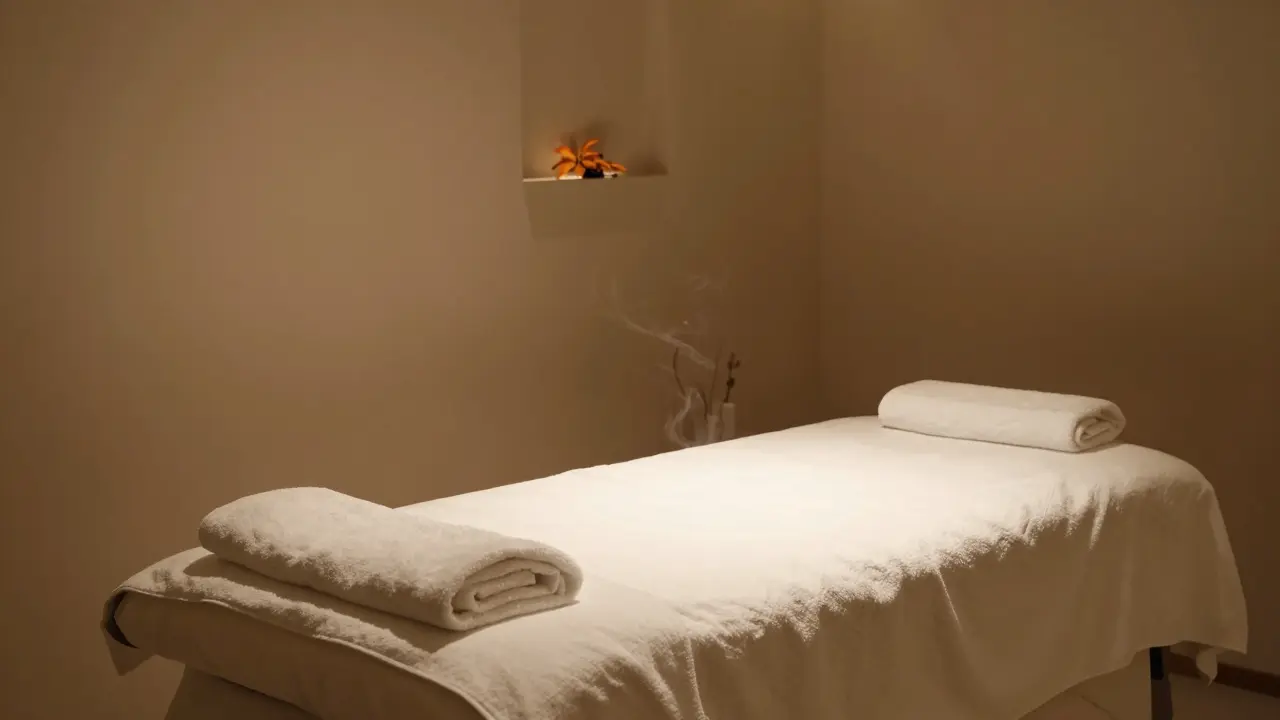Imagine sinking into a plush chair in your favorite Dubai spa, expecting blissful relaxation. But what if a gentle foot massage could do more harm than good? Massages are supposed to heal, not hurt—yet for some, those soothing strokes might actually spell trouble.
Let's sort through the myths, science, and real-life risks. Whether you crave weekly pampering or a quick stress-buster after work, there are moments when a foot massage is simply the wrong idea. We'll dive deep into foot massage contraindications, how health conditions factor in, and what every seasoned spa-goer in Dubai should know before booking their next rub-down.
Knowing Your Limits: Absolute Reasons to Avoid Foot Massage
Sometimes, you really should say no to that tempting foot massage offer. Certain health conditions and scenarios can make massage downright dangerous—not just uncomfortable. For instance, people with deep vein thrombosis (DVT) or other blood clotting disorders face serious risk if a massage dislodges a clot. The UAE Ministry of Health and Prevention has published reminders about avoiding massage in these cases, as a sudden clot movement can lead to a life-threatening embolism.
If you've had recent surgery on your legs or feet, even the gentlest touch can disrupt delicate healing tissues. We're talking not just about large incisions, but also procedures like bunion removal or fracture repair. If in doubt, always wait for clearance from your doctor before any manual therapy. Pregnant women should also exercise caution, especially in the first trimester or if they have experienced complications. While some spas in Dubai offer prenatal foot massage, reputable therapists always check for red flags before starting.
Contagious skin infections—think athlete's foot, plantar warts, or cellulitis—are another hard stop. Massaging over these areas can spread germs to other clients and therapists or worsen your own infection. Many top-rated Dubai spas stick to strict hygiene protocols, but it's still your responsibility to disclose anything that might put you or someone else at risk. If you have open wounds, fresh blisters, or burns, keep shoes on and feet off-limits until healed.
Here's a quick breakdown of absolute no-gos for foot massage:
- DVT or known blood clots
- Recent fractures or surgery
- Poorly-controlled diabetes with loss of sensation
- Active skin infections or open wounds
- Severe edema (swelling) of unknown cause
- Acute gout attacks
- Unexplained severe pain in the feet
According to a 2023 report from the Dubai Health Authority, diabetic foot complications are a growing problem in the city. Loss of sensation (neuropathy) means injuries can go unnoticed. So if you’re managing diabetes, always get the green light from your healthcare team before booking a session, and choose therapists trained in diabetic care.
Another scenario? Right after a sprain, strain, or heavy bruising, your body needs rest, not kneading. Massaging an area that’s acutely injured increases blood flow and swelling—slowing down recovery or even making the injury worse.
The Less-Obvious Risks: Situational and Daily Precautions for Foot Massage
Sometimes, skipping a foot massage comes down to the context. Did you just get a new tattoo on your ankle? Have you started a round of antibiotics for an infected toenail? Everyday situations—often overlooked—can make an innocent spa treat risky. Even post-vaccination soreness near the ankle or shins might warrant holding off for a session or two.
Flu season brings its own complications. If you feel feverish, achy, or have a cold, your immune system needs rest. Massages can occasionally trigger immune reactions, making you feel worse, not better. Plus, it’s just good etiquette to avoid spreading illness in close-contact spa settings.
Sometimes, medications can change how your body reacts to touch. For example, blood thinners like warfarin or aspirin make you prone to bruising. Even a gentle rub could leave dark marks or, in rare cases, cause internal bleeding. A 2024 study published in the "International Journal of Massage Science" found an uptick in mild-to-moderate bruising incidents in spa customers taking anticoagulants, especially those aged over 55. Always inform your therapist about any long-term medications.
Travel can make things complicated, too. If you’ve been sitting on a long-haul flight and your ankles are swollen, resist the urge for immediate massage. Swelling might sometimes signal a hidden clot—better to stay safe and move around gently instead. Likewise, if you have varicose veins, strong pressure can worsen irritation or even rupture delicate vessels. In Dubai, the rate of varicose veins has climbed with sedentary lifestyles, and local spas are increasingly customizing care for this condition.
Sensitive skin is another underappreciated factor. Have you tried a new foot cream or nail polish recently? Allergic reactions can leave skin vulnerable and inflamed, even before you notice a rash. Perfumed massage oils, though tempting, might not mix well if your skin barrier is compromised. For spa newbies, a patch test or fragrance-free product is always a smart move. Ask your therapist to go light, and be straightforward about any discomfort.
Think twice, too, after intense foot workouts, like long-distance running or heavy gym sessions. Microscopic muscle tears need gentle recovery, not stimulation. Jumping straight into a deep tissue rub could prolong soreness or swelling rather than speed up repair. Give your body a day or so to bounce back first.
Here's a helpful table for quick reference on less-obvious but common foot massage precautions:
| Situation | Why Wait? |
|---|---|
| New tattoos or piercings on feet/ankles | Risk of infection and delayed healing |
| On antibiotics for foot infection | Massage may spread infection or irritate healing skin |
| Fever, flu, or viral illness | Can exacerbate symptoms and spread germs |
| Recent allergy flare or skin reaction | Sensitive skin may react badly to oils or pressure |
| Intense workout or sports injury | Promotes swelling, hinders normal recovery |
| Starting new medication (esp. blood thinners) | Unexpected bruising or sensitivity possible |
If you have questions, the best spas in Dubai are upfront about screening. Any reputable therapist asks for your health background, and the best ones adapt every session to what your body needs—not just what’s on their menu.

Smart Foot Massage Tips: Making the Most of Every Session (When It’s Safe)
Assuming you’ve cleared all medical concerns, how do you squeeze the most comfort—and zero risk—out of a foot massage? Preparation and communication are key. Start by making sure your therapist knows about any injuries, allergies, or chronic complaints. Great Dubai spa therapists never mind a quick health chat; it keeps you safe and makes the session more relaxing.
Timing matters. Wait at least 24-48 hours after heavy physical activity or any incident that caused swelling or bruising. If you’re looking for relief after a workout, use simple rest, ice, compression, and elevation (the classic R.I.C.E. method) first. Massage is most helpful after the acute stage, when pain and swelling have faded.
If it’s your first foot massage, don’t be shy about asking questions. Want lighter touch or extra attention to tight spots? Let your therapist know. Conversely, speak up for pain, tingling, or anything that feels "off." Silence isn’t bravery—your feet are packed with nerves, and unusual sensations can be a warning sign. During a 2022 survey at Dubai’s Burj Spa, 78% of clients said the best massages started with honest feedback.
What about at-home foot rubs? They’re fine for most healthy adults, but the same rules apply. Don’t self-massage over swollen, red, or broken skin, and stick to gentle circular strokes. Skip aggressive pressure unless you’re sure there’s no underlying injury. Essential oils can be lovely, but always check for allergies first—tea tree and peppermint sound relaxing but can be irritating to some.
For those new to Dubai’s humidity, sweat makes feet prone to fungal infections. Towel off thoroughly before any session and avoid walking barefoot in public areas. Eczema or psoriasis sufferers should keep their skin cool and clean and let their therapist know about any sensitive patches. Most therapists in this city have training in dealing with common local skin issues—that’s one perk of going somewhere experienced.
Preferred time? No scientific consensus, but many regulars find midday or late afternoon best, when feet are warm, not swollen from morning activity. Quick tip: avoid foot massage right after a heavy meal—even light pressure can trigger indigestion if you’re still digesting your biryani lunch.
Use this simple checklist before booking your next foot massage in Dubai:
- No fever, illness, or recent infections
- No new injuries, tattoos, or allergy flares
- Medications (especially blood thinners) discussed with therapist
- Allergies/sensitivities disclosed
- Skin is intact and free from rashes/wounds
And remember—while a foot massage can feel like a mini-vacation, it’s not a substitute for medical care. Pain or problems that don’t resolve need a doctor, not a spa visit. When in doubt, pause and consult someone trained. The best results happen not just from skilled hands, but from good timing, honest updates, and a bit of self-awareness. Protect your health, and your toes will thank you long after you’ve left the soothing calm of Dubai’s best spa lounges.
FAQ
- When should you absolutely avoid a foot massage?
If you have DVT, active infections, recent surgical wounds, or loss of sensation from diabetes, do not get a foot massage. - Is it okay to get a foot massage with swollen ankles?
- If the cause is unknown—especially after traveling—skip the session until a doctor checks for blood clots.
- What if I have minor cuts or blisters?
- Wait until your skin heals completely to avoid infection and irritation during the massage.
- Can pregnant women have foot massages safely?
- Yes, but therapy should be by a trained prenatal specialist and only when there are no medical complications.
- Do blood thinners make foot massage dangerous?
- Yes, you’re at higher risk for bruising or bleeding, so always warn your therapist and choose very gentle techniques.






